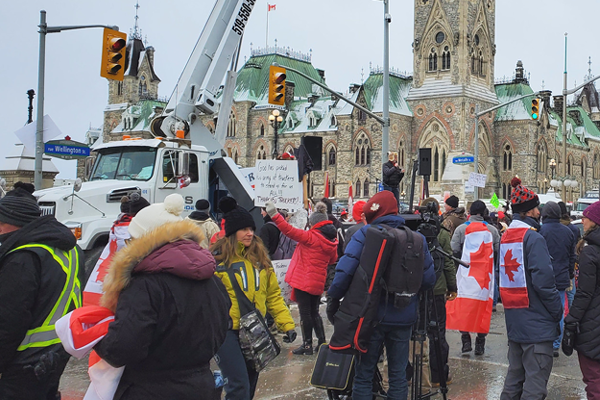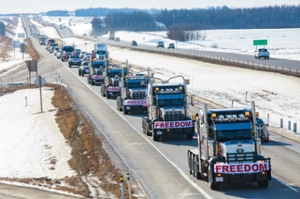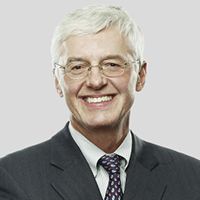
The Truckers Convoy: Examining the Consequences for Canada
Take your pick how you want to describe the so-called Truckers Convoy, whether you feel sympathetic or repelled, one thing is certain—in the eyes of the world Canada’s stature has been damaged.
By Dale Eisler, Policy Fellow, Johnson Shoyama Graduate School of Public Policy; Kevin Lynch, former Clerk of the Privy Council, and former Vice-Chair BMO FinancialIntroduction
Download this issue of JSGS Policy Brief.
Take your pick how you want to describe the so-called Truckers Convoy, whether you feel sympathetic or repelled, one thing is certain—in the eyes of the world Canada’s stature has been damaged. Just consider the spectacle that caught the globe’s attention. For three weeks the heart of the nation’s capital was taken over by angry protestors. Huge trucks paralyzed the city centre. A few of the protestors waved Nazi, U.S. Confederate, and QAnon flags and spewed racial slurs. The Prime Minister was spirited away to an undisclosed location for safety, the largest border crossing to the United States was blockaded for days, and the Ottawa police for 20 days were incapable of restoring order in the shadow of the Peace Tower. It was hardly a Canadian public relations triumph.
For a nation that prides itself on “peace, order and good government”, we advertised to the world that we are less peaceful, less orderly and less capable of governing than they, or we, imagined. Nor did the federal government’s imposition of the never-before-used Emergencies Act to quell the protest help Canada’s global image.
The Emergencies Act is specifically designed to deal with a “national emergency” which in the government’s own words says “seriously threatens the ability of the Government of Canada to preserve the sovereignty, security and territorial integrity of Canada.” Those are severe-sounding, even disturbing words and, without context or perspective, what springs to mind on Fox News, or BBC, or China CCTV or France-TV is likely the image of a dysfunctional and troubled country. Even the normally measured and reflective Economist magazine, in a rather hyperbolic editorial, labeled use of the Emergencies Act as an “assault on free speech.” (February 19, 2022) The fact the Charter of Rights and Freedoms was not suspended, use of the Act was tightly circumscribed and subject to judicial and Parliamentary oversight didn’t change opinion. The international damage was done.
Is this a momentary embarrassment or a long term set back? It depends, and time will tell. But no one should make the mistake of underestimating the harm. With the damaging theatrics over but the memory still vivid, it’s time to take stock. As Canadians, we have to ask ourselves honestly and clearly what happened, why it happened and most importantly what Canada can and should do to address the inevitable consequences of these failures.
Extreme Positions and Deepened Divides

The first and most pressing consequence is the political context of deepening divides and shrinking common ground in Canada. One can argue that majority opinion was solidly against the more extreme people, ideas and behaviours that were on display in the trucker occupations, although supportive of the democratic right to protest. Fair point, except that is not the point. What really stands out is the depth of the polarization.
In recent years, Canada has become a cauldron of ever more heated political rhetoric and emotions, often drawn on regional, rural-urban and identity lines. Importing some of the worst aspects of today’s American politics, social media platforms have enabled misinformation, conspiracy theories, identity politics and wedge issues to fester and divide in Canada.
The two major political parties have done little to bridge these divides and more to inflame them. The Trudeau government has implemented a so-called progressive agenda, wrapped in virtual signalling, that has moved government policy, whether fiscal or social, significantly to the left. At the same time the Conservative opposition has noisily moved ever more to the right, appropriating the banner of freedom to justify extreme positions on issues such as climate change, vaccine mandates and gun ownership. Nothing exemplified their hard lurch to the right more than their embrace of the Ottawa trucker occupation.
The result of all this is that the centre of Canadian politics is being hollowed out. This void, which historically has represented majority opinion in Canada, no longer has a political party that reflects its interests and priorities. If Canada is going to find common ground on the formidable set of issues that the Ottawa trucker fiasco brought to the surface, the Liberal and Conservative parties need to regain their centres. The political discourse in this country needs to shift from an obsession with partisan interests and identity politics to a principled but also pragmatic debate about the public interest. Doing this in an age of growing populism and a social media environment that plays to emotions rather than reason is going to be very difficult. But the consequences of continuing on the current course are clear and unsettling, and isn’t that what leadership is all about: making tough decisions when faced with difficult choices.
Threats to Canada’s Economy
The second consequence is economic, as foreign investors and global corporations re-appraise Canada as a place to do business.
Ask yourself: what would you think if you had built a plant in Canada to take advantage of NAFTA (now USMCA) to export to the United States. With that as your business strategy, you then witnessed border blockages at the Ambassador bridge in Windsor and the Coutts border crossing in Alberta stopping trucks for days on end without effective action by the federal government, which is responsible for the border, or the respective provincial police forces. It goes without saying you would be concerned. But now say that you operate highly integrated plants on both sides of the border, relying on just-in-time delivery, to build complex products on precision production schedules. You would now be questioning the business model itself.
Trade is the lifeblood of the Canadian economy, the source of the majority of well-paying industrial jobs and three quarters of Canadian trade is with the United States. The Windsor crossing is not only the busiest in the country, but it is also essential to the North American auto industry. Combining this “border uncertainty” with growing “Buy American” policies and discriminatory U.S. tax preferences for electric vehicles, puts the Canadian auto sector in mortal danger. Imagine what auto makers with headquarters in the U.S. must be thinking as they gear up to build the facilities to produce the next generation of electric cars and trucks, to develop and manufacture the new battery systems to power them and to write the complex software to run them. Does anyone really doubt that the Governor of Michigan will point to the truck blockades as an added reason to make those huge investments in the United States not Canada?
Any “thickening” of the Canada-U.S. border is a competitive blow to Canadian business and a negative signal to foreign investors. After 9/11, Canadian officials worked around-the-clock to keep the border open, working with the U.S. to make the border both secure and efficient through the Smart Border Action Plan, which was bolstered by the Beyond the Border Action Plan in 2011. It is rather paradoxical and ironic that it is Canada that has “thickened” the border because of the trucker border blockages, the lack of enforcement when they occurred, and the risk of copycat ones in the future. Like 2001, Canada needs a plan to reduce or eliminate the blockage-induced border uncertainty premium on Canadian business.
Loss of Confidence in Policing
Third is the loss of confidence in police and governments to enforce the laws of the land. Canadians rightly believe that no one is above the law. But it appears that cornerstone belief of our society has been undermined. It became obvious with the Ottawa occupation, but had become apparent in recent months and years, with the burning of churches, destruction of public statues, the blockage of rail lines or the sabotage of energy infrastructure. Obviously, policing efforts need to be proportional and measured, and not seek to escalate the situation.
But the trucker occupation of Ottawa was characterized by an incomprehensible breakdown of basic policing. How do you explain the poor intelligence gathering of police forces despite the truckers use of social media to organize; the bizarre decision to permit heavy rigs to occupy Wellington Street, which is home not only to Parliament but also the Prime Minister’s Office, the Supreme Court and the Bank of Canada; the lack of coordination among police forces with no discernible leadership for almost three weeks; and, the costs imposed on small business owners and their workers by the prolonged shutdown of their shops?
What citizens of Ottawa (and Windsor and Coutts) experienced, and people around the world witnessed, was a failure by police to enforce the law, and an absence of leadership by municipal, provincial and federal governments to act to protect citizens and their communities. Trust, once lost, is much harder to regain.
Damage to Canada’s Brand
The fourth consequence is the damage and loss of value to Canada’s brand. What has happened is the unexpected appearance of “Canada risk”. An essential element of the global Canada brand for years has been safety, security and effective government, a perception that has long helped to attract global talent, international investment, foreign students and tourists. But the Economist exemplified the changing perspective, observing: “Canada once seemed immune to the raucous populism that in 2016 gave the world Mr. Trump and Brexit. Now it seems to have become a super-spreader.”
Business will ask itself some fundamental and pivotal investment questions. Can it confidently invest in Canada and expect the projects, with all required regulatory approvals, to be built and operated without the illegal obstructions that we have witnessed on pipelines, rail-lines and border crossings? Will global financial institutions be as willing to fund large projects in Canada without higher risk premia? How will Canada fare in the next round of international competitiveness rankings, which rightly or wrongly influence investment decisions? And what about Canadian businesses: will their next expansion be at home or elsewhere?
What does all this add up to? The direction is unfortunately clear in the absence of effective and forward-thinking action by government. There will be less business investment, less foreign investment, a shrinking auto sector, less trust in government institutions, and slower growth in an economy where trend growth was already veering downward pre-pandemic.
Where Do We Go From Here?
So, what can be done to remediate these consequences?
The most effective and meaningful action would be for the two major political parties to re-discover their “centres”. Polarization provides shelter for disrespectful dissent, and undermines the common ground which is essential for the social contract underlying “peace, order and good government”. Our political parties should not emulate the rampant, and destructive, populism of the United States.
On the policy front, what is missing is a sense of inclusion for many Canadians. The federal government should set out an economic agenda that responds to widespread public concerns about the shape of the Canadian economy going forward, and “my place in it.” Too much talk of social re-engineering, climate re-engineering, and technology re-engineering and not enough discussion about economic retooling for the average worker in this changing and challenging world, one that is a scary place for many people. Paradoxically, for a government which prides itself on its “inclusiveness”, its economic agenda appears not to include many of these workers and their families in sectors and jobs that face the real life consequences of “re-engineering.”
On the investment front, Canada has to respond convincingly on trade facilitation and specifically as it relates to the auto sector. We need specific legislation to protect “trade corridors” from illegal blockades, with predetermined fines and automatic injunctive relief, as Anne McLellan and John Manley (Globe and Mail, February 25, 2022) among others have argued. With respect to the auto sector, in addition to the trade corridors legislation, Canadian governments will have to invest public funds to entice the global auto sector to build critical components of electric vehicles in Canada (batteries, software, assembly, etc) to offset both the protectionist policies of the United States and the “border risk” created by the trucker protests.
On the policing front, governments need to invest more in policing capacity (intelligence gathering, training, etc) and policing leadership. The federal government needs to make the RCMP a national police force, one that can come rapidly and effectively to the aid of local police forces anywhere in the country. Rather than borrowing RCMP officers from provincial and municipal policing duties as it does today, it should have a dedicated national Rapid Response Force with the training, equipment and leadership to restore long term confidence in our ability to enforce our laws.
And we should prosecute the truck protesters to the full extent of the law for their actions that broke the law, not for the act of protesting. In the eyes of the public, this is a critical element of re-establishing our norms of acceptable behaviour and confidence that they will be enforced.
In conclusion, there should be no doubting the harmful effects the Ottawa protest and occupation has had on Canada’s standing in the world. It has altered perceptions from that of a stable, predictable even boring nation to one that is a deeply divided and polarized society. Those impressions are hopefully overstated, distorted by the actions of a small minority. But as many often say, “perception is reality”. Accepting that reality, the first priority on the policy agenda by all the political actors should be to repair the damage and restore Canada’s image in the eyes of the world.
Download this issue of JSGS Policy Brief.
ISSN 2369-0224 (Print) ISSN 2369-0232 (Online)
Dale Eisler

Prior to joining the Johnson Shoyama Graduate School of Public Policy, Dale Eisler spent 16 years with the Government of Canada in a series of senior positions, including as Assistant Deputy Minister Natural Resources Canada; Consul General for Canada in Denver, Colorado; Assistant Secretary to Cabinet at the Privy Council Office in Ottawa; and, Assistant Deputy Minister with the Department of Finance. In 2013, he received the Government of Canada’s Joan Atkinson Award for Public Service Excellence. Prior to joining the federal government, Dale spent 25 years as a journalist. He holds a degree in political science from the University of Saskatchewan, Regina Campus and an MA in political studies from Vermont College. He also studied as a Southam Fellow at the University of Toronto, and is the author of three books, including Anton, a historical fiction novel that has been turned into a feature film.
Kevin Lynch

The Honourable Kevin Lynch served as the Vice Chairman of BMO Financial Group from 2010-2020. Prior to that, he was a distinguished former public servant with 33 years of service with the Government of Canada, serving as Clerk of the Privy Council, Secretary to the Cabinet, Deputy Minister of Finance, Deputy Minister of Industry as well as Executive Director for Canada at the International Monetary Fund. Dr. Lynch is the past Chancellor of the University of King’s College, the past Chair of the Board of Governors of the University of Waterloo, a Senior Fellow of Massey College and a Trustee of the Killam Trusts. Since retiring from government, he has written over 140 policy Op Ed’s and articles and speaks frequently at conferences in Canada and abroad. He holds a B.A. (Mount Allison University), a Masters in Economics (University of Manchester), and a doctorate in Economics (McMaster University). He was made a Member of the Queen’s Privy Council for Canada in 2009, was appointed an Officer of the Order of Canada in 2011, has received 11 honorary doctorates from Canadian Universities and was awarded the Queen’s Golden and Diamond Jubilee Medals for public service.

